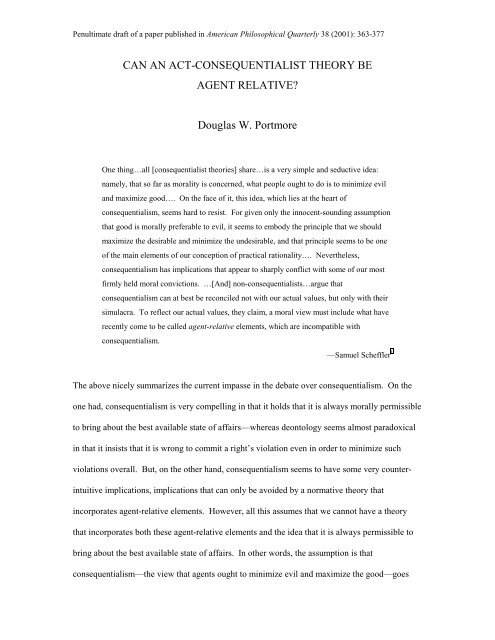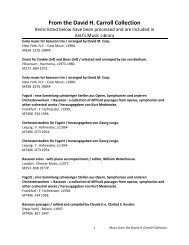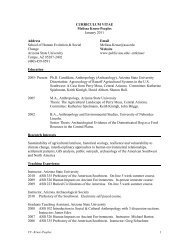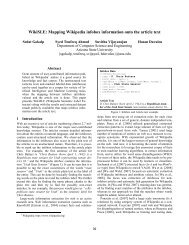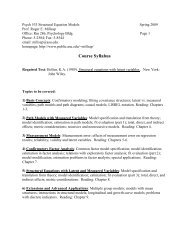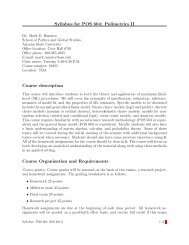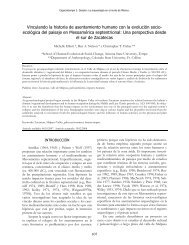can a consequentialist theory be agent relative - Arizona State ...
can a consequentialist theory be agent relative - Arizona State ...
can a consequentialist theory be agent relative - Arizona State ...
You also want an ePaper? Increase the reach of your titles
YUMPU automatically turns print PDFs into web optimized ePapers that Google loves.
Penultimate draft of a paper published in Ameri<strong>can</strong> Philosophical Quarterly 38 (2001): 363-377<br />
CAN AN ACT-CONSEQUENTIALIST THEORY BE<br />
AGENT RELATIVE?<br />
Douglas W. Portmore<br />
One thing…all [<strong>consequentialist</strong> theories] share…is a very simple and seductive idea:<br />
namely, that so far as morality is concerned, what people ought to do is to minimize evil<br />
and maximize good…. On the face of it, this idea, which lies at the heart of<br />
consequentialism, seems hard to resist. For given only the innocent-sounding assumption<br />
that good is morally preferable to evil, it seems to embody the principle that we should<br />
maximize the desirable and minimize the undesirable, and that principle seems to <strong>be</strong> one<br />
of the main elements of our conception of practical rationality…. Nevertheless,<br />
consequentialism has implications that appear to sharply conflict with some of our most<br />
firmly held moral convictions. …[And] non-<strong>consequentialist</strong>s…argue that<br />
consequentialism <strong>can</strong> at <strong>be</strong>st <strong>be</strong> reconciled not with our actual values, but only with their<br />
simulacra. To reflect our actual values, they claim, a moral view must include what have<br />
recently come to <strong>be</strong> called <strong>agent</strong>-<strong>relative</strong> elements, which are incompatible with<br />
consequentialism.<br />
—Samuel Scheffler 1<br />
The above nicely summarizes the current impasse in the debate over consequentialism. On the<br />
one had, consequentialism is very compelling in that it holds that it is always morally permissible<br />
to bring about the <strong>be</strong>st available state of affairs—whereas deontology seems almost paradoxical<br />
in that it insists that it is wrong to commit a right’s violation even in order to minimize such<br />
violations overall. But, on the other hand, consequentialism seems to have some very counterintuitive<br />
implications, implications that <strong>can</strong> only <strong>be</strong> avoided by a normative <strong>theory</strong> that<br />
incorporates <strong>agent</strong>-<strong>relative</strong> elements. However, all this assumes that we <strong>can</strong>not have a <strong>theory</strong><br />
that incorporates both these <strong>agent</strong>-<strong>relative</strong> elements and the idea that it is always permissible to<br />
bring about the <strong>be</strong>st available state of affairs. In other words, the assumption is that<br />
consequentialism—the view that <strong>agent</strong>s ought to minimize evil and maximize the good—goes
hand in hand with <strong>agent</strong> neutrality. In this paper, I argue that it is a mistake to equate<br />
consequentialism with <strong>agent</strong>-neutrality.<br />
I. INTRODUCTION<br />
A <strong>theory</strong> is <strong>agent</strong> neutral if it gives every <strong>agent</strong> the exact same set of aims and <strong>agent</strong> <strong>relative</strong><br />
otherwise. 2<br />
Thus utilitarianism is <strong>agent</strong> neutral, for it gives every <strong>agent</strong> the same single aim: the<br />
maximization of aggregate welfare. Kantianism, on the other hand, is <strong>agent</strong> <strong>relative</strong>; it gives<br />
different <strong>agent</strong>s different aims. For instance, it gives me the aim that I not break my promises but<br />
you the aim that you not break your promises. Of course, we are both bound by the same<br />
categorical imperative: “never break one’s promises.” But this imperative generates different<br />
aims for different <strong>agent</strong>s, <strong>be</strong>cause it contains the indexical “one’s promises,” which refers to my<br />
promises when addressed to me but to your promises when addressed to you.<br />
This distinction <strong>be</strong>tween <strong>agent</strong>-<strong>relative</strong> and <strong>agent</strong>-neutral theories is now recognized as <strong>be</strong>ing<br />
one of the most important in normative ethics, for only an <strong>agent</strong>-<strong>relative</strong> <strong>theory</strong> <strong>can</strong> accommodate<br />
the basic features of commonsense morality: options, constraints, and special obligations. 3<br />
Consider, for instance, that a <strong>theory</strong> would have to <strong>be</strong> <strong>agent</strong> <strong>relative</strong> in order to accommodate a<br />
constraint against murder, for such a constraint would prohibit the commission of murder even<br />
for the sake of preventing numerous others from committing comparable murders. The <strong>be</strong>st an<br />
<strong>agent</strong>-neutral <strong>theory</strong> <strong>can</strong> do, on the other hand, is give everyone the aim of minimizing murders;<br />
yet this would permit the commission of murder for the sake of minimizing murders overall,<br />
which is just contrary to the very nature of a constraint. 4<br />
Given the importance, then, of <strong>agent</strong> relativity in accommodating our commonsense moral<br />
intuitions, it is important to ask whether an act-<strong>consequentialist</strong> <strong>theory</strong> <strong>can</strong> <strong>be</strong> <strong>agent</strong> <strong>relative</strong>. 5<br />
If<br />
it <strong>can</strong>not, there <strong>can</strong> <strong>be</strong> no hope of ever reconciling act-consequentialism (hereafter, simply<br />
“consequentialism”) with our commonsense moral intuitions. 6 (I'm assuming, of course, that it<br />
2
would count in a <strong>theory</strong>’s favor to <strong>be</strong> in accord with our most basic commonsense intuitions. 7 )<br />
Now it seems that the only hope for success along these lines lies with the possibility of<br />
combining consequentialism with some sort of <strong>agent</strong>-<strong>relative</strong> <strong>theory</strong> of value. 8<br />
If such a union is<br />
possible, then perhaps consequentialism <strong>can</strong> accommodate most, if not all, of our commonsense<br />
moral intuitions. For consider the <strong>theory</strong> obtained by applying the <strong>consequentialist</strong> principle “act<br />
always so as to maximize value” to an axiology where both of the following are true: (1) the<br />
value of a state of affairs in which a murder has <strong>be</strong>en committed is <strong>agent</strong> <strong>relative</strong> such that its<br />
value varies according to whether or not the evaluator is the murderer, and (2) the disvalue in an<br />
<strong>agent</strong> committing murder herself is, from her position (that of the <strong>agent</strong>), greater than the<br />
disvalue in numerous others committing comparable murders. 9<br />
On this <strong>theory</strong>, it would <strong>be</strong> wrong<br />
to commit murder even in order to minimize murders overall, and it would <strong>be</strong> wrong on<br />
<strong>consequentialist</strong> grounds: the state of affairs in which the <strong>agent</strong> commits murder herself is, from<br />
her position, worse than the one in which numerous others commit comparable murders. 10<br />
Of course, many philosophers would deny that a <strong>consequentialist</strong> <strong>theory</strong> <strong>can</strong> <strong>be</strong> <strong>agent</strong> <strong>relative</strong>.<br />
In this paper, I will examine some of the reasons why philosophers have come to this conclusion<br />
and argue that they all prove inadequate. I will then attempt to resolve the issue by determining<br />
what it is that is distinctive about consequentialism. It is not, as many suppose, a particular view<br />
about what’s right and wrong. For, as I will show, <strong>consequentialist</strong>s and non-<strong>consequentialist</strong>s<br />
<strong>can</strong> agree that <strong>agent</strong>s should always act so as to promote value. 11<br />
What is distinctive about<br />
consequentialism, then, is its acceptance of the principle “act always so as to promote value” as a<br />
fundamental moral principle—that is, as a principle that does not derive from any other<br />
substantive moral principle. Or so I will argue. Lastly, I will show how this distinctive feature<br />
of consequentialism <strong>can</strong> <strong>be</strong> combined an <strong>agent</strong>-<strong>relative</strong> <strong>theory</strong> of value to yield a promising<br />
theoretical alternative to both deontology and utilitarianism.<br />
3
II. MINIMIZING VIOLATIONS AND THE CONSEQUENTIALISM/NON-<br />
CONSEQUENTIALISM DISTINCTION<br />
Let us call a right’s violation that prevents numerous others (i.e., two or more) from committing<br />
comparable right’s violations a minimizing violation. 12<br />
In the last section, I suggested that<br />
consequentialism could accommodate the intuition that it is impermissible to commit minimizing<br />
violations so long as it adopts a suitable, <strong>agent</strong>-<strong>relative</strong> <strong>theory</strong> of value. But to do so requires the<br />
<strong>consequentialist</strong> to include as one of the consequences of committing a minimizing violation that<br />
the <strong>agent</strong> has herself committed a right’s violation. Only then <strong>can</strong> the <strong>consequentialist</strong> claim that<br />
the consequences of committing a minimizing violation are worse than not doing so. Therefore,<br />
the <strong>consequentialist</strong> must adopt a rather broad conception of an act's consequences so as to<br />
include the commission of the act itself as one of its consequences. However, some philosophers<br />
deny that the act itself is a constitutive part of the state of affairs it produces. But this, I think, is<br />
a mistake resulting from philosophers too closely associating consequentialism and utilitarianism<br />
in their minds. This association has led many philosophers to mistake features of utilitarianism<br />
for features of consequentialism. For instance, prior to Michael Slote's influential work, 13 it was<br />
common to view maximizing rationality as definitive of consequentialism. Yet nowadays most<br />
philosophers acknowledge the possibility of satisficing consequentialism. Similarly, many<br />
philosophers have <strong>be</strong>en led to mistakenly think that consequentialism is only concerned with the<br />
value of outcomes, and not with that of the acts that produce them, given that utilitarianism holds<br />
that the acts themselves (viewed independently of their outcomes) <strong>can</strong> <strong>be</strong> neither good nor bad.<br />
But utilitarianism views the acts themselves as evaluatively neutral, not <strong>be</strong>cause it is<br />
<strong>consequentialist</strong>, but <strong>be</strong>cause it is welfarist. Given welfarism, all that matters intrinsically is the<br />
welfare of individuals. As a result, nothing <strong>be</strong>sides welfare matters intrinsically, thereby<br />
excluding the evaluative relevance of the acts themselves, as viewed independently of their<br />
effects on the welfare of individuals. 14<br />
4
So it seems a mistake to force upon the <strong>consequentialist</strong> an arbitrarily narrow construal of an<br />
act's consequences. Besides, even some of consequentialism's most ardent critics accept that<br />
consequentialism is entitled to a very broad construal of an act's consequences. 15<br />
For instance,<br />
consider what Bernard Williams has to say about consequentialism in his famous essay "A<br />
Critique of Utilitarianism":<br />
Standardly, the action will <strong>be</strong> right in virtue of its causal properties, of maximally<br />
conducing to good states of affairs. Sometimes, however, the relation of the action to the<br />
good state of affairs may not <strong>be</strong> that of cause to effect—the good state of affairs may <strong>be</strong><br />
constituted, or partly constituted, by the <strong>agent</strong>'s doing that act.... 16<br />
Aside from construing an act’s consequences too narrowly, the most common reason for<br />
denying the possibility of consequentialism accommodating the impermissibility of minimizing<br />
violations is the alleged synonymy of “<strong>agent</strong> neutrality” and “consequentialism.” 17<br />
For instance,<br />
David McNaughton and Piers Rawling have claimed that the distinction <strong>be</strong>tween<br />
consequentialism and non-consequentialism is <strong>be</strong>st drawn in terms of the distinction <strong>be</strong>tween<br />
<strong>agent</strong>-neutral and <strong>agent</strong>-<strong>relative</strong> theories. 18<br />
On their view, a <strong>theory</strong> is <strong>consequentialist</strong> if and only<br />
if it is <strong>agent</strong> neutral and non-<strong>consequentialist</strong> if and only if it is <strong>agent</strong> <strong>relative</strong>. However, as<br />
Frances Howard-Snyder points out in her paper "The Heart of Consequentialism," 19 it is a<br />
mistake to draw the distinction <strong>be</strong>tween consequentialism and non-consequentialism in this way,<br />
for not all <strong>agent</strong>-neutral theories are <strong>consequentialist</strong>. 20<br />
Imagine, for instance, a moral <strong>theory</strong> that<br />
gives every <strong>agent</strong> the same solitary aim of ensuring that the streets are paved with gold. 21<br />
This<br />
<strong>theory</strong> is clearly <strong>agent</strong> neutral since it gives every <strong>agent</strong> the same single aim (and thus the same<br />
set of aims). But is it <strong>consequentialist</strong>? McNaughton and Rawling are committed to answering<br />
yes, necessarily so, for, as they define consequentialism, all <strong>agent</strong>-neutral theories are<br />
<strong>consequentialist</strong>. But suppose that this <strong>theory</strong> holds that the state of affairs in which the people<br />
are fed is <strong>be</strong>tter than the one in which the streets are paved with gold. And suppose that,<br />
5
nevertheless, the <strong>theory</strong> still insists that the right thing to do is to ensure that the streets are paved<br />
with gold even where this precludes feeding the people. Surely, in this case, the <strong>theory</strong> would <strong>be</strong><br />
non-<strong>consequentialist</strong>, for, as Howard Snyder rightly points out, a <strong>consequentialist</strong> <strong>theory</strong> <strong>can</strong><br />
never require an <strong>agent</strong> to produce a worse state of affairs rather than a <strong>be</strong>tter. 22<br />
Thus an <strong>agent</strong>neutral<br />
<strong>theory</strong> needn't <strong>be</strong> <strong>consequentialist</strong>.<br />
This alone is enough to show that it is a mistake to equate the consequentialism/nonconsequentialism<br />
distinction with the <strong>agent</strong>-neutral/<strong>agent</strong>-<strong>relative</strong> distinction. But it is still an<br />
open question whether a <strong>consequentialist</strong> <strong>theory</strong> <strong>can</strong> <strong>be</strong> <strong>agent</strong>-<strong>relative</strong>. And the answer to this<br />
question is what the possibility of reconciling consequentialism with commonsense morality<br />
hinges upon. Howard-Snyder's own view is that a <strong>consequentialist</strong> <strong>theory</strong> <strong>can</strong>not <strong>be</strong> <strong>agent</strong><br />
<strong>relative</strong>. She <strong>be</strong>lieves that at the heart of consequentialism is the idea that "the <strong>be</strong>tter a state of<br />
affairs from an <strong>agent</strong>-neutral point of view, the more moral reason an <strong>agent</strong> has to produce it." 23<br />
This, she thinks, is what all <strong>consequentialist</strong>s accept and all non-<strong>consequentialist</strong>s deny. 24<br />
Howard-Snyder calls this idea "BETTER."<br />
But is BETTER really what's at the heart of consequentialism? Consider the following<br />
theorist (call him Theo). Theo accepts a rather peculiar sort of divine-command <strong>theory</strong>. He<br />
accepts all of the following:<br />
(1) Morality is God's creation such that there are no moral standards independent of<br />
God's will.<br />
(2) An act is morally permissible if and only if it conforms to God's will.<br />
(3) God's will is that we all do our <strong>be</strong>st to maximize aggregate pleasure.<br />
(4) The only thing valuable for its own sake is pleasure and the absence of pain.<br />
Theo is, I will argue, a non-<strong>consequentialist</strong> who accepts BETTER. I grant that Theo's <strong>theory</strong> is<br />
not very plausible. But it is enough for my purposes that it contains no inconsistencies. For all<br />
6
that I need to show is that it is logically possible for a non-<strong>consequentialist</strong> to accept BETTER.<br />
This by itself is sufficient to prove that BETTER is not definitive of consequentialism.<br />
Theo accepts BETTER, for he <strong>be</strong>lieves that the <strong>be</strong>tter a state of affairs (the more aggregate<br />
pleasure it contains), the more moral reason an <strong>agent</strong> has to produce it. He <strong>be</strong>lieves, just as all<br />
(maximizing) <strong>consequentialist</strong>s do, that <strong>agent</strong>s should always bring about the <strong>be</strong>st available state<br />
of affairs. But, unlike the <strong>consequentialist</strong>, his <strong>be</strong>lief that <strong>agent</strong>s should always bring about the<br />
<strong>be</strong>st available state of affairs is derivative of another, more fundamental, moral principle: "act in<br />
accordance with God's will"—see (2). This principle in conjunction with his view about what<br />
God wills us to do—see (3)—generates the prescription: "act so as to maximize aggregate<br />
pleasure." For the <strong>consequentialist</strong>, on the other hand, the <strong>be</strong>lief that <strong>agent</strong>s should always bring<br />
about the <strong>be</strong>st available state of affairs is non-derivative. It is for the <strong>consequentialist</strong> the most<br />
fundamental of all moral principles, the one from which all others derive.<br />
Now the question is, Is Theo a <strong>consequentialist</strong>? It seems not. For he doesn't <strong>be</strong>lieve that<br />
there is any necessary connection <strong>be</strong>tween what's right and what's valuable. It is, on his view,<br />
just a coincidence that God wills us to do what maximizes value. In fact, God could change his<br />
mind and will that we pave the streets with gold, in which case, we would <strong>be</strong> required to ensure<br />
that the streets are pave with gold even where this means doing less than we <strong>can</strong> to promote<br />
value. Of course, Theo does, as it happens, accept a <strong>theory</strong> that is extensionally equivalent to<br />
hedonic act-utilitarianism (hereafter, "utilitarianism"); this, however, is not sufficient to make<br />
him a utilitarian. For although extensionally equivalent, Theo's <strong>theory</strong> and utilitarianism are<br />
importantly different. According to utilitarianism, it is wrong to do less than one <strong>can</strong> to promote<br />
aggregate pleasure <strong>be</strong>cause that entails producing a sub-optimal state of affairs. Theo, on the<br />
other hand, thinks that it is wrong to do less than one <strong>can</strong> to promote aggregate pleasure, not<br />
<strong>be</strong>cause it involves producing a sub-optimal state of affairs, but <strong>be</strong>cause it involves diso<strong>be</strong>ying<br />
the will of God. This means that the two theories have different truth conditions. Utilitarianism<br />
7
is correct only if hedonism is, whereas Theo's <strong>theory</strong> does not depend on the correctness of<br />
hedonism—if God wills it, <strong>agent</strong>s should, on Theo's view, maximize aggregate pleasure whether<br />
there are other things of non-instrumental value or not. 25<br />
In contrast, Theo's <strong>theory</strong> depends on<br />
God's will whereas utilitarianism does not—after all, an atheist <strong>can</strong> <strong>be</strong> a utilitarian.<br />
But <strong>be</strong>sides the two theories having different truth conditions, there is another important<br />
difference <strong>be</strong>tween the two, one that involves the fact that <strong>consequentialist</strong>s are constrained in a<br />
way that non-<strong>consequentialist</strong>s are not. A <strong>consequentialist</strong> <strong>can</strong> prohibit only those acts (i.e., act<br />
tokens) that result in a sub-optimal state of affairs. Thus the <strong>consequentialist</strong> <strong>can</strong> accept, for<br />
instance, an absolute constraint against promise-breaking (the act-type) only if she adopts a<br />
<strong>theory</strong> of value according to which breaking a promise always results in a worse state of affairs<br />
than keeping it. Such a <strong>theory</strong> of value would have to include the following four claims: (1) the<br />
value of a kept promise is lexically prior to all other values, (2) the disvalue of a broken promise<br />
is <strong>agent</strong> <strong>relative</strong> such that the extent of its disvalue varies according to whether or not the<br />
evaluator is the promise breaker, (3) the <strong>agent</strong>-<strong>relative</strong> disvalue in breaking a promise is, from the<br />
<strong>agent</strong>'s perspective, greater than the disvalue in any num<strong>be</strong>r of other <strong>agent</strong>s breaking their<br />
promises, and (4) the <strong>agent</strong>-<strong>relative</strong> disvalue of a broken promise is "moment <strong>relative</strong>" 26 such that<br />
the disvalue in breaking a promise now is, from the <strong>agent</strong>'s present position, greater than the<br />
disvalue in her breaking any num<strong>be</strong>r of other promises in the future. Now I am not making any<br />
assertion about the plausibility of such an axiology. The point is only that if such a <strong>theory</strong> of<br />
value were correct, then consequentialism would include an absolute constraint against promisebreaking.<br />
Note, then, how consequentialism and non-consequentialism differ. The<br />
<strong>consequentialist</strong> <strong>can</strong> accept such a constraint only if she also accepts the four claims above. The<br />
non-<strong>consequentialist</strong>, on the other hand, is not constrained in this way. She <strong>can</strong> accept an<br />
absolute constraint against promise-breaking without having to accept these four claims. Unlike<br />
8
the <strong>consequentialist</strong>, the non-<strong>consequentialist</strong> <strong>can</strong> accept that it is sometimes wrong to bring<br />
about the <strong>be</strong>st available state of affairs.<br />
So we have seen that a utilitarian and a divine-command theorist <strong>can</strong> accept extensionally<br />
equivalent theories, as both Jeremy Bentham and Theo do. What's more, we <strong>can</strong> also construct<br />
versions of virtue ethics and contractarianism that are extensionally equivalent to utilitarianism.<br />
Take, for instance, the virtue ethicist who accepts the fundamental moral principle: "act as a<br />
virtuous <strong>agent</strong> would characteristically do in the circumstances." 27<br />
When this principle is<br />
coupled with the view that what it is characteristic for virtuous <strong>agent</strong>s to do in all circumstances<br />
is to maximize aggregate pleasure, we arrive at a view that is extensionally equivalent to<br />
utilitarianism. Similarly, we <strong>can</strong> generate an extensionally equivalent contractarian position by<br />
combining the contractarian principle "act in accordance with those rules that would <strong>be</strong> chosen<br />
by rational <strong>agent</strong>s <strong>be</strong>hind the veil of ignorance" with the view that what rational <strong>agent</strong>s would try<br />
to do in such a situation is maximize their expected utilities. The upshot of all this is that we<br />
<strong>can</strong>not distinguish various normative theories in terms of which acts they take to <strong>be</strong> right and<br />
wrong. Instead, we must distinguish various normative theories in terms of what moral<br />
principles they take to <strong>be</strong> fundamental. And, therefore, what distinguishes the <strong>consequentialist</strong><br />
from the non-<strong>consequentialist</strong> is the acceptance of the principle "act always so as to promote<br />
value" as a fundamental moral principle. So the <strong>consequentialist</strong> is one who accepts the principle<br />
"always act so as to promote value" as a fundamental moral principle. And the non<strong>consequentialist</strong><br />
is one who either rejects this principle or accepts it as <strong>be</strong>ing derivative of some<br />
other, more fundamental, moral principle.<br />
III. GETTING CLEAR ON THE DISTINCTION<br />
I have suggested that we must distinguish <strong>consequentialist</strong>s from non-<strong>consequentialist</strong>s in terms<br />
of whether or not they accept the principle "act always so as to promote value" as a fundamental<br />
9
moral principle, that is, as a principle that does not derive from any other moral principle.<br />
Strictly speaking, however, every substantive moral principle derives from the principle "act<br />
morally." But the principle "act morally" is a formal principle, and just as all theories of<br />
rationality endorse the formal principle "act rationally," all moral theories endorse the formal<br />
principle "act morally." 28<br />
Moral theories, then, differ according to which substantive moral<br />
principles they take to <strong>be</strong> fundamental. So when I say that all <strong>consequentialist</strong>s take the principle<br />
"act always so as to promote value" to <strong>be</strong> fundamental, or non-derivative, I mean non-derivative<br />
of any other substantive moral principle.<br />
I should also make clear that my distinction allows for the possibility that the <strong>consequentialist</strong><br />
takes the principle "act always so as to promote value" to <strong>be</strong> derivative of certain meta-ethical<br />
claims—it just <strong>can</strong>'t <strong>be</strong> derivative of any other substantive moral principle. For instance,<br />
someone might come to accept consequentialism on the basis of the following meta-ethical<br />
claims: (1) there is a conceptual connection <strong>be</strong>tween morality and reasons for action such that an<br />
<strong>agent</strong> is morally required to φ if and only if she has a decisive reason to φ and (2) there is a<br />
conceptual connection <strong>be</strong>tween reasons for action and the value of states of affairs such that an<br />
<strong>agent</strong> has a decisive reason to φ if and only if φing would produce the <strong>be</strong>st available state of<br />
affairs. These two imply (3) that an <strong>agent</strong> is morally required to φ if and only if φing would<br />
produce the <strong>be</strong>st available state of affairs. And so we see that maximizing consequentialism <strong>can</strong><br />
<strong>be</strong> derived from certain meta-ethical claims. 29<br />
Now having said this, one might wonder whether Theo is just a <strong>consequentialist</strong> who differs<br />
from other <strong>consequentialist</strong>s in holding a different meta-ethical position. Theo does accept a<br />
certain meta-ethical position, namely, that morality is God's creation. But this is not what makes<br />
Theo a non-<strong>consequentialist</strong>. Theo is a non-<strong>consequentialist</strong>, <strong>be</strong>cause he accepts a different<br />
normative position than <strong>consequentialist</strong>s do. That is, Theo thinks that one should always act in<br />
accordance with God's will. This normative position is not just another way of expressing the<br />
10
meta-ethical view that morality is God's creation, for one <strong>can</strong> accept that an act is morally<br />
permissible if and only if it conforms with God's will but deny that morality is God's creation.<br />
For instance, one might hold the standards of morality to <strong>be</strong> independent of God’s will and<br />
accept the principle "act in accordance with God's will" on the grounds that that God is all good<br />
and an all-good god would always will that one does what's right and not what's wrong.<br />
IV. AGENT RELATIVITY AND ACT-CONSEQUENTIALISM<br />
For all that I have said so far I still haven’t proven that a <strong>theory</strong> <strong>can</strong> <strong>be</strong> both <strong>agent</strong>-<strong>relative</strong> and<br />
<strong>consequentialist</strong>. Although I have shown that what is definitive of consequentialism is a<br />
fundamental commitment to the principle “act always so as to promote value,” there remains the<br />
possibility that <strong>agent</strong>-neutrality is also definitive of consequentialism. In this case, the<br />
consequentialism/non-consequentialism distinction would <strong>be</strong> a bipartite distinction. 30<br />
But even if<br />
I have not proven that a <strong>theory</strong> <strong>can</strong> <strong>be</strong> both <strong>agent</strong> <strong>relative</strong> and <strong>consequentialist</strong>, I have at least<br />
undermined two of the most common reasons for thinking that it <strong>can</strong>not: I have argued that it is a<br />
mistake both to exclude the act itself from its consequences and to equate that the <strong>agent</strong>neutral/<strong>agent</strong>-<strong>relative</strong><br />
distinction with the consequentialism/non-consequentialism distinction.<br />
Yet, admittedly, there are some philosophers who avoid both mistakes and still insist that <strong>agent</strong><br />
neutrality is definitive of consequentialism. For instance, both Shelly Kagan and John Broome<br />
call theories that assess the rightness of acts solely on basis of their propensity to promote value<br />
“teleological” as opposed to “<strong>consequentialist</strong>.” 31<br />
They recommend that we reserve the term<br />
“consequentialism” for those theories that are both teleological and <strong>agent</strong> neutral. And they both<br />
appeal to common usage in support of their terminology. And, admittedly, consequentialism is<br />
most often used to refer exclusively to <strong>agent</strong>-neutral theories—though there are some notable<br />
exceptions. 32<br />
However, the Kagan/Broome terminology <strong>can</strong> itself <strong>be</strong> misleading, <strong>be</strong>cause the<br />
expression “teleological ethics” is often given a much broader reference. As it was first<br />
11
introduce, “teleological ethics” was meant to denote only those theories that “hold that the<br />
rightness or wrongness of an action is always determined by its tendency to produce certain<br />
consequences which are intrinsically good or bad.” 33<br />
But, since then, “consequentialism” has<br />
come to supplant the more cum<strong>be</strong>rsome “teleological ethics.” And, when employed nowadays,<br />
the expression “teleological ethics” is more often used in a broader sense so as to include not just<br />
consequentialism but also virtue ethics. For instance, teleological theories are often defined as<br />
those that take goodness to <strong>be</strong> prior to rightness. But, on this definition, virtue ethics is a form of<br />
a teleological ethics <strong>be</strong>cause its takes goodness to <strong>be</strong> prior to rightness. For, according to virtue<br />
ethics, an act is right if and only if it is what an <strong>agent</strong> of good character would do in the<br />
circumstances, and so one must first determine what constitutes a good character <strong>be</strong>fore<br />
determining what the right thing to do is. 34<br />
Another problem with the Kagan/Broome terminology is that it seems arbitrarily restrictive.<br />
After all, we would think it arbitrary to restrict (by definitional means) divine-command theorists<br />
to a particular view about God’s will, and, likewise, arbitrary to restrict (by definitional means)<br />
contractarians to a particular view about what contractors would agree to. But isn’t it just as<br />
arbitrary to restrict <strong>consequentialist</strong>s to a purely <strong>agent</strong>-neutral <strong>theory</strong> of value? If no particular<br />
substantive view is definitive of consequentialism, then what grounds are there for limiting (by<br />
definitional means) the sorts of substantive positions available to the <strong>consequentialist</strong>?<br />
Nevertheless, even if there is no legitimate reason for taking <strong>agent</strong> neutrality to <strong>be</strong> definitive of<br />
consequentialism, there might <strong>be</strong> other grounds for restricting the <strong>consequentialist</strong> to a purely<br />
<strong>agent</strong>-neutral <strong>theory</strong> of value. To illustrate, consider the following non-arbitrary reason for<br />
restricting the divine-command theorist to a particular view about God’s will. If divine command<br />
<strong>theory</strong> is defined as the view that takes as fundamental the principle “act always so as to <strong>be</strong> in<br />
accord with God’s will,” then there may seem to <strong>be</strong> nothing to prevent a divine-command<br />
theorist from adopting the view that God’s will is malicious. Such a position is not ruled out by<br />
12
the definition of divine-command <strong>theory</strong>. However, it might <strong>be</strong> ruled out by the definition of<br />
God. If God is, by definition, all-good, then we <strong>can</strong> rule out all substantive versions of divinecommand<br />
<strong>theory</strong> that take God’s will to <strong>be</strong> malicious. But although we might legitimately<br />
confine the divine-command theorist to the view that God’s will is <strong>be</strong>nevolent on the grounds<br />
that God is, by definition, omni-<strong>be</strong>nevolent, the presumption should always <strong>be</strong> that theorists are<br />
free to apply their fundamental principle(s) as they see fit. This means that the burden of proof<br />
falls upon those who would restrict the <strong>consequentialist</strong> to a purely <strong>agent</strong>-neutral <strong>theory</strong> of value<br />
to provide some sort of rationale for doing so. Let me now attempt to preempt those who might<br />
try.<br />
One reason for thinking that <strong>consequentialist</strong>s should <strong>be</strong> confined to a purely <strong>agent</strong>-neutral<br />
<strong>theory</strong> of value has to do with a certain conception of intrinsic value. Consequentialism is often<br />
defined as the view that takes the right act to <strong>be</strong> the one that maximizes (or, at least, promotes)<br />
intrinsic goods. But to say that something is intrinsically good is to say that the source of its<br />
goodness lies entirely with its own intrinsic nature and not with its relations or circumstances.<br />
As Moore puts it,<br />
To say that a kind of value is ‘intrinsic’ means merely that the question whether a thing<br />
possesses it, and in what degree it possesses it, depends solely on the intrinsic nature of<br />
the thing in question. 35<br />
Agent-<strong>relative</strong> value, then, must <strong>be</strong> a type of extrinsic value, for its value depends upon the<br />
relation of the evaluator to the state of affairs <strong>be</strong>ing evaluated. So if consequentialism must <strong>be</strong><br />
defined in terms of intrinsic goods and not extrinsic goods, then <strong>agent</strong> neutrality is definitive of<br />
consequentialism. This, then, seems to <strong>be</strong> a non-arbitrary reason for restricting the<br />
<strong>consequentialist</strong> to a purely <strong>agent</strong>-neutral <strong>theory</strong> of value. However, this rests on a mistake.<br />
Consequentialism has come to <strong>be</strong> defined in terms of intrinsic goods only as a result of a<br />
conflation of what are in fact two separate distinctions in goodness.<br />
13
One is the distinction <strong>be</strong>tween things valued for their own sakes and things valued for the<br />
sake of something else—<strong>be</strong>tween ends and means, or final and instrumental goods. The<br />
other is the distinction <strong>be</strong>tween things which have their value in themselves and things<br />
which derive their value from some other source: intrinsically good things versus<br />
extrinsically good things. 36<br />
When these two distinctions are kept separate, it <strong>be</strong>comes clear that consequentialism should <strong>be</strong><br />
defined in terms of final goods, not intrinsic goods. For if we were to define consequentialism in<br />
terms of intrinsic goods, we would exclude from the <strong>consequentialist</strong>’s consideration a whole<br />
class of goods, namely, extrinsic goods. Yet the <strong>consequentialist</strong> is always concerned with<br />
whether or not something is good. The source of that goodness—whether it derives from its own<br />
intrinsic nature or some other source—is irrelevant. On the other hand, if we define<br />
consequentialism in terms of final goods, we do not exclude any class of goods from<br />
consideration. Instrumental goods will <strong>be</strong> accounted for to the full extent of their value, for<br />
instrumental goods are valuable only in so far as they are means to some final good. Thus, when<br />
defined as the view that takes the right act to <strong>be</strong> the one that maximizes final goods,<br />
consequentialism is able to take full account of all types of goods.<br />
Important, then, is the fact that <strong>agent</strong>-<strong>relative</strong> goods <strong>can</strong> <strong>be</strong> valued for their own sakes. For<br />
instance, it might <strong>be</strong> that the value of Smith’s happiness is <strong>agent</strong>-<strong>relative</strong> such that it is greater for<br />
a friend than for a stranger, but this is compatible with both the friend and the stranger valuing<br />
Smith’s happiness for its own sake. So although consequentialism would <strong>be</strong> rightly restricted to<br />
a purely <strong>agent</strong>-neutral <strong>theory</strong> of value if consequentialism were only concerned with intrinsic<br />
goods, we find that that is not the case.<br />
Another reason for thinking that consequentialism should <strong>be</strong> confined to a purely <strong>agent</strong>neutral<br />
<strong>theory</strong> of value is the thought that consequentialism must <strong>be</strong> so restricted in order to<br />
remain consistent with the objective, categorical, and universal nature of morality. It is common<br />
14
to view morality as a system of categorical imperatives such that an <strong>agent</strong>’s duties do not depend<br />
on her subjective desires. 37<br />
On this view, an <strong>agent</strong>’s obligation to keep her promise is not<br />
contingent upon her having some subjective end that would <strong>be</strong> furthered by keeping that promise.<br />
Now it is true that if applied to a certain sort of <strong>agent</strong>-<strong>relative</strong> <strong>theory</strong> of value, one where the<br />
value of a state of affairs varies depending upon the evaluator’s subjective desires,<br />
consequentialism would generate different obligations for <strong>agent</strong>s with differing desires. We<br />
might, then, arrive at some form of ethical egoism. But we needn’t see the relativity of value as<br />
<strong>be</strong>ing attached to an <strong>agent</strong>’s subjective desires. We <strong>can</strong>, alternatively, see the relativity of value<br />
as <strong>be</strong>ing attached to an <strong>agent</strong>’s position. We obtain such a <strong>theory</strong> by applying the principle “act<br />
always so as to maximizes value” to a version of evaluator relativism 38 that relativizes the value<br />
of states of affairs to certain objective positions, like that of <strong>agent</strong> or bystander. 39<br />
Suppose, for<br />
instance, that the disvalue of the state of affairs in which an <strong>agent</strong> has committed murder for the<br />
sake of preventing five others from committing comparable murders varies according to whether<br />
or not the evaluator is the <strong>agent</strong> in question. 40<br />
Suppose that from the <strong>agent</strong>’s position the state of<br />
affairs in which she commits murder for the sake of preventing the five others from committing<br />
murder (call this S 1 ) is worse than the one where she refrains from committing murder and so<br />
allows the five others to each commit murder (call this S 2 )—worse, perhaps, <strong>be</strong>cause <strong>agent</strong>s <strong>be</strong>ar<br />
a special responsibility for their own actions. But now suppose that from the position of an<br />
innocent bystander, S 2 is worse than S 1 since there are more murders in S 2 . When this version of<br />
evaluator relativism is combined with the principle “act always so as to bring about the <strong>be</strong>st<br />
available state of affairs,” we obtain categorical imperatives. For instance, those in a position to<br />
prevent five others from committing murder by committing murder themselves should refrain<br />
from doing so irrespective of their own personal interests or desires. 41<br />
For, on the given<br />
axiological view, the disvalue of a murder would not depend on the murder <strong>be</strong>ing detrimental to<br />
the evaluator’s interests or on the evaluator lamenting the victim’s death. It would instead<br />
15
depend solely upon the position of the evaluator: <strong>agent</strong> or bystander. So the evaluator <strong>can</strong>not<br />
choose which state of affairs, S 1 or S 2 , is more valuable. For although the correct ranking of the<br />
two states of affairs will vary according to the evaluator’s position, the ranking is fixed and<br />
unvarying for each position. Therefore, S 1 is, objectively speaking, <strong>be</strong>tter than S 2 from the<br />
position of an innocent bystander. And S 2 is, objectively speaking, <strong>be</strong>tter than S 1 from the<br />
position of the <strong>agent</strong>. 42 , 43<br />
So I have shown that what may have initially seemed to <strong>be</strong> legitimate reasons for restricting<br />
the <strong>consequentialist</strong> to a purely <strong>agent</strong>-neutral <strong>theory</strong> of value turn out to <strong>be</strong> inadequate. But now<br />
in absence of any legitimate reason for restricting the <strong>consequentialist</strong> to a purely <strong>agent</strong>-neutral<br />
<strong>theory</strong> of value, we should conclude that it would <strong>be</strong> arbitrary to do so.<br />
V. CONCLUSION<br />
I have argued that there is no good reason for supposing that a normative <strong>theory</strong> <strong>can</strong>not <strong>be</strong> both<br />
<strong>consequentialist</strong> and <strong>agent</strong> <strong>relative</strong>. The obvious response to this is to point out that<br />
“consequentialism” is a term of art, and so one <strong>can</strong> just stipulate that s/he will only use the term<br />
to denote a certain subset of <strong>agent</strong>-neutral theories. And I have no problem with those who make<br />
such a conscious stipulation. However, what I have tried to combat in this paper is the tendency<br />
among many philosophers to equate consequentialism with <strong>agent</strong>-neutrality and nonconsequentialism<br />
with <strong>agent</strong>-relativity. It is important combat this tendency, <strong>be</strong>cause the<br />
conflation of the consequentialism/nonconsequentialism and the <strong>agent</strong>-neutral/<strong>agent</strong>-<strong>relative</strong><br />
distinctions has had some rather unfortunate effects on twentieth century moral philosophy.<br />
First, it has prevented moral philosophers from exploring a new and interesting theoretical<br />
possibility: <strong>agent</strong>-<strong>relative</strong> consequentialism. (For the last two centuries, ethicists have focused,<br />
almost exclusively, on just two theoretical possibilities: deontology (i.e., <strong>agent</strong>-<strong>relative</strong><br />
nonconsequentialism) and utilitarianism (i.e., <strong>agent</strong>-neutral consequentialism)—leaving the<br />
16
prospects for a hybrid <strong>theory</strong> completely unexplored. 44 , 45 ) Second, the conflation of these two<br />
distinctions has prevented us from breaking the “spell” that utilitarianism has had over most of<br />
modern moral philosophy. As a num<strong>be</strong>r of philosophers have noted with curiosity, utilitarianism<br />
has tended to haunt even those who are convinced that it is wrong. Something about it is very<br />
compelling, if not “spellbinding.” 46<br />
Nevertheless, most insist that utilitarianism is wrong, for too<br />
many of its implications conflict with our deeply held moral convictions. Indeed, it is <strong>be</strong>cause of<br />
its counter-intuitiveness that Bernard Williams predicted in 1973 that “The day <strong>can</strong>not <strong>be</strong> too far<br />
off in which we hear no more about it.” 47<br />
Yet decades later utilitarianism continues to haunt<br />
us—non-utilitarians still feel compelled to defend against it. But why has utilitarianism had this<br />
spellbinding force? What about it is so compelling? It seems to <strong>be</strong> the thought that it <strong>can</strong> never<br />
<strong>be</strong> wrong to bring about the <strong>be</strong>st available state of affairs. 48 , 49<br />
For how could it <strong>be</strong> wrong to<br />
produce what is admittedly the <strong>be</strong>st available alternative? 50<br />
So, on the one hand, we want to reject any view that has the counter-intuitive implications<br />
associated with utilitarianism. But, on the other hand, it seems that we should accept the idea<br />
that it is always permissible to pursue the <strong>be</strong>st available state of affairs. Yet, as most see it, one<br />
<strong>can</strong>not do both. For it may seem that the following are true: (1) only an <strong>agent</strong>-<strong>relative</strong> <strong>theory</strong> <strong>can</strong><br />
avoid the counter-intuitive implications associated with utilitarianism, (2) only a <strong>consequentialist</strong><br />
<strong>theory</strong> <strong>can</strong> endorse the idea that it is always morally permissible to produce the <strong>be</strong>st available<br />
state of affairs, and (3) all <strong>consequentialist</strong>s theories are, by definition, <strong>agent</strong> neutral. Thus it<br />
seems that we are faced with a rather unattractive dilemma: either bite the bullet and accept the<br />
counter-intuitive implications associated with utilitarianism or give up the compelling idea that it<br />
is always permissible to bring about the <strong>be</strong>st available state of affairs. But, as I have shown, this<br />
is in fact a false dilemma. Agent-<strong>relative</strong> consequentialism shares with all <strong>consequentialist</strong><br />
theories the idea that it is always permissible to bring about the <strong>be</strong>st available state of affairs—it<br />
differs from <strong>agent</strong>-neutral <strong>consequentialist</strong> theories only in that it denies that there is always a<br />
17
state of affairs that <strong>can</strong> <strong>be</strong> said to <strong>be</strong> <strong>be</strong>st, period, irrespective of the evaluator’s position in<br />
relation to that state of affairs. Yet, unlike <strong>agent</strong>-neutral consequentialism, <strong>agent</strong>-<strong>relative</strong><br />
consequentialism <strong>can</strong> avoid the counter-intuitive implications associated with utilitarianism. As<br />
we have seen, it does so provided that a certain <strong>theory</strong> of value is correct, e.g., one where the<br />
disvalue in committing murder is <strong>agent</strong> <strong>relative</strong>. Now ultimately we may decide to reject such a<br />
<strong>theory</strong> of value, but it is worth exploring since the result would <strong>be</strong> a <strong>theory</strong> that takes what’s <strong>be</strong>st<br />
about utilitarianism while leaving <strong>be</strong>hind its counter-intuitive implications. 51<br />
Notes:<br />
1 From the introduction of Consequentialism and Its Critics, edited by Samuel Scheffler, (New York:<br />
Oxford University Press: 1988), pp. 1-2.<br />
2 This distinction comes from Derek Parfit, Reasons and Persons (Oxford: Clarendon Press, 1984)—see p.<br />
27. Parfit, however, is a bit imprecise in his initial formulation of the distinction. He says that an <strong>agent</strong>neutral<br />
<strong>theory</strong> gives all <strong>agent</strong>s common aims and that an <strong>agent</strong>-<strong>relative</strong> <strong>theory</strong> gives different <strong>agent</strong>s<br />
different aims. But what about a <strong>theory</strong> that gives every <strong>agent</strong> a few common aims while at the same time<br />
giving some <strong>agent</strong>s different aims? As I draw the distinction, the <strong>theory</strong> comes out <strong>agent</strong> <strong>relative</strong>. Although<br />
it gives all <strong>agent</strong>s some common aims, it does not give every <strong>agent</strong> the same set of aims. Later on, it<br />
<strong>be</strong>comes clear that this is also what Parfit has in mind, as he later refers to <strong>agent</strong>-neutral theories as those<br />
that give to all <strong>agent</strong>s only common aims—see p. 129.<br />
3 Both constraints and special obligations limit an <strong>agent</strong>’s freedom to pursue the <strong>be</strong>st overall state of affairs<br />
(i.e., the <strong>be</strong>st state of affairs from an impersonal standpoint). Constraints prohibit the commission of certain<br />
act-types (e.g., murder) even for the sake of preventing numerous others from committing comparable<br />
instances of that act-type. Special obligations are duties specific to an individual given her particular<br />
circumstances and history. These include duties arising out of past acts (e.g., the duty to keep one’s<br />
promises) and also those duties that come with occupying certain roles (e.g., professional duties and familial<br />
obligations). In contrast to both constraints and special obligations, options do not prohibit an <strong>agent</strong> from<br />
doing what will produce the <strong>be</strong>st overall state of affairs. Options provide <strong>agent</strong>s with the choice of either<br />
safeguarding their own interests or sacrificing those interests for the sake of the overall good. In the case of<br />
options, <strong>agent</strong>s are permitted to perform a non-optimific act even where that act does not involve the<br />
violation of either a constraint or special obligation. (The above is meant only to <strong>be</strong> a brief sketch of the<br />
18
three basic features of commonsense morality. For a more thorough and illuminating account, see Shelly<br />
Kagan’s The Limits of Morality (Oxford: Clarendon Press, 1989) and “The Structure of Normative Ethics,”<br />
Philosophical Perspectives 6 (1992): 223-42. )<br />
4 See Ro<strong>be</strong>rt Nozick, Anarchy, <strong>State</strong>, and Utopia (New York: Basic Books, 1974), pp. 28-33.<br />
5 Clearly rule-consequentialism is <strong>agent</strong> <strong>relative</strong>. Like Kantianism, rule-consequentialism includes rules<br />
containing indexicals, which generate different aims for different <strong>agent</strong>s. And <strong>be</strong>cause of its <strong>agent</strong>relativity,<br />
it is able to accommodate many of our commonsense moral intuitions. But what I wish to explore<br />
in this paper is whether an act-<strong>consequentialist</strong> <strong>theory</strong> <strong>can</strong> <strong>be</strong> <strong>agent</strong> <strong>relative</strong>.<br />
6 Although indirect <strong>consequentialist</strong> theories, such as rule-consequentialism and motive consequentialism,<br />
have <strong>be</strong>en somewhat successful in accommodating our commonsense moral intuitions, it is worth<br />
considering whether act-consequentialism <strong>can</strong> <strong>be</strong> reconciled with our commonsense moral intuitions.<br />
7 Although this is widely accepted, there are a few detractors. Most notable in recent years is Peter Unger.<br />
See his Living High and Letting Die (Oxford: Oxford University Press, 1996), and see Frances Kamm’s<br />
response: “Grouping and the Imposition of Loss,” Utilitas 10 (1998): 292-319.<br />
8 An <strong>agent</strong>-<strong>relative</strong> <strong>theory</strong> of value is one where the value of a state of affairs <strong>can</strong> vary from one individual<br />
to another, and vary not just in terms whether or not it is valuable but also in the degree to which it is<br />
valuable.<br />
9 I am purposely <strong>be</strong>ing vague in not specifying whether, from the <strong>agent</strong>'s position, there is any num<strong>be</strong>r of<br />
murders committed by others that would outweigh the <strong>agent</strong>-<strong>relative</strong> disvalue in an <strong>agent</strong> committing<br />
murder herself. My own opinion is that there is and that this num<strong>be</strong>r, whatever it may <strong>be</strong>, marks the<br />
"threshold" <strong>be</strong>yond which <strong>agent</strong>s are permitted to commit murder for the sake of minimizing murders<br />
overall.<br />
10 Call the state of affairs where the <strong>agent</strong> has herself committed murder S 1 , and call the state of affairs<br />
where numerous others have committed comparable murders S 2 . The claim that S 1 is, from the <strong>agent</strong>'s<br />
position, worse than S 2 is meant to <strong>be</strong> an objective claim. It may seem, however, that it must <strong>be</strong> a subjective<br />
claim since whether or not S 1 is worse than S 2 depends on the position of the evaluator—that is, it depends<br />
on whether she is the murderer or just some innocent bystander. There is, after all, a long tradition of taking<br />
objective claims to <strong>be</strong> those whose truth does not depend on either the position or perspective of the<br />
assessor. For many philosophers take the objective view to <strong>be</strong> the "view from nowhere." As Nagel puts it,<br />
"a view or form of thought is more objective that another if it relies less on the specifics of the individual's<br />
makeup and position in the world..."—see The View from Nowhere (Oxford: Oxford University Press,<br />
1986), p. 5. Nevertheless, there would seem to <strong>be</strong> such a thing as "positional objectivity." Consider the<br />
claim "the sun is setting." The truth of this claim is position-dependent, for if two people, on opposite<br />
coasts of the United <strong>State</strong>s, assert, at the same time, that the sun is setting, it <strong>can</strong> turn out that one is correct<br />
while the other incorrect. Yet this is not to say that it is a subjective claim. It is obviously not. For whether<br />
the sun is setting at a particular place and time does not depend on anything in the mind. Nor does it<br />
19
depend on anyone observing that the sun setting. The claim "the sun is setting" is true if and only if the sun<br />
is indeed setting at the time and place of its utterance. For a more thorough discussion of positional<br />
objectivity, see Amartya Sen, "Positional Objectivity," Philosophy & Public Affairs 22 (1993): 126-45.<br />
11 The principle "promote value" is meant to <strong>be</strong> neutral <strong>be</strong>tween maximizing and satisficing versions of<br />
consequentialism.<br />
12 I borrow this term from Kasper Lippert-Rasmussen, “Moral Status and the Impermissibility of<br />
Minimizing Violations,” Philosophy & Public Affairs 25 (1996): 334. The phrase “preventative violation”<br />
is also used to mean roughly the same thing—see Christopher McMahon, "The Paradox of Deontology,"<br />
Philosophy & Public Affairs 20 (1991): 350.<br />
13 I'm referring to his book Common-Sense Morality and Consequentialism (London: Routledge & Kegan<br />
Paul, 1985).<br />
14 This point comes from Amartya Sen, "Well-Being, Agency and Freedom," Journal of Philosophy 82<br />
(1985): 181-2.<br />
15 For some supporters of consequentialism who advocate a broad construal of an act's consequences, see<br />
John Broome, Weighing Goods (Oxford: Blackwell, 1991), 4; Fred Feldman Utilitarianism, Hedonism, and<br />
Desert (Cambridge: Cambridge University Press, 1997); and David Sosa "Consequences of<br />
Consequentialism," Mind 102 (1993): 102-22.<br />
16 See Samuel Scheffler, The Rejection of Consequentialism (Oxford: Oxford University Press, 1982), pp.<br />
1-2, fn. 2.<br />
17 See, for example, Shelly Kagan, The Limits of Morality (Oxford: Clarendon Press, 1989), p. 8; David<br />
McNaughton and Piers Rawling, "Honoring and Promoting Values," Ethics 102 (1992): 836; and Samuel<br />
Scheffler, The Rejection of Consequentialism (Oxford: Oxford University Press, 1982), pp. 1-3.<br />
18 See "Honoring and Promoting Values," Ethics 102 (1992): 836.<br />
19 In Philosophical Studies 76 (1993): 107-29.<br />
20 As a result of her paper, McNaughton and Rawling have backed away from their initial position. They<br />
now <strong>be</strong>lieve that <strong>agent</strong>-neutrality is only a necessary, not a sufficient, condition for a <strong>theory</strong> <strong>be</strong>ing<br />
<strong>consequentialist</strong>. Thus a <strong>theory</strong> is <strong>consequentialist</strong> only if it is <strong>agent</strong> neutral—see "Value and Agent-<br />
Relative Reasons," Utilitas 7 (1995): 35, fn. 11.<br />
21 Howard-Snyder, "The Heart of Consequentialism," Philosophical Studies 76 (1993): 109.<br />
22 Ibid.<br />
23 Ibid., p. 112.<br />
24 Ibid., p. 110.<br />
25 Theo does accept hedonism, for, as I imagine him to <strong>be</strong>, he accepts claim (4). But his <strong>theory</strong> about what<br />
makes an act right does not depend on him accepting hedonism or any other <strong>theory</strong> of value.<br />
26 I borrow this term from Broome, Weighing Goods (Oxford: Blackwell, 1991), p. 10.<br />
20
27 Rosalind Hursthouse, “Normative Virtue Ethics” in Roger Crisp (ed.), How Should One Live? (Oxford:<br />
Clarendon Press, 1996), pp. 19-36.<br />
28 This distinction mirrors Derek Parfit’s distinction <strong>be</strong>tween formal and substantive aims—see his Reasons<br />
and Persons (Oxford: Clarendon Press, 1984), p. 3.<br />
29 Although there may not <strong>be</strong> any sharp distinction <strong>be</strong>tween meta-ethics and normative ethics, (1) and (2)<br />
are quite clearly meta-ethical. They are about conceptual connections <strong>be</strong>tween morality and rationality and<br />
rationality and value. And (3) is quite clearly a claim of normative ethics. It is a moral principle.<br />
30 The utilitarianism/non-utilitarianism distinction is a bipartite distinction. A <strong>theory</strong> is utilitarian if and<br />
only if it is both <strong>consequentialist</strong> and welfarist. And a <strong>theory</strong> is non-utilitarian if and only if it is either non<strong>consequentialist</strong><br />
or non-welfarist.<br />
31 See John Broome, Weighing Goods (Oxford: Blackwell, 1991), pp. 3-6 and Shelly Kagan, Normative<br />
Ethics (Boulder, CO: Westview Press, 1998), pp. 63 & 310.<br />
32 See Amartya Sen, “Positional Objectivity,” Philosophy & Public Affairs 22 (1993): 142-5; James Dreier,<br />
“Structures of Normative Theories,” The Monist 76 (1993): 22-40; Frances Kamm, Morality, Mortality,<br />
Vol. II (Oxford: Oxford University Press, 1997), p. 239; Thomas Hurka, Perfectionism (Oxford: Oxford<br />
University Press, 1993), p. 60; and Eliza<strong>be</strong>th Anderson, Value in Ethics and Economics (Cambridge, Mass.:<br />
Harvard University Press, 1993), pp. 30-1.<br />
33 C. D. Broad, Five Types of Ethical Theory (London: Routledge & Kegan Paul, 1930), pp. 206-7.<br />
34 See Justin Oakley, “Varieties of Virtue Ethics,” Ratio (New Series) IX (1996): p. 129.<br />
35 “The Conception of Intrinsic Value” reprinted in Thomas Baldwin (ed.), Principia Ethica, Revised<br />
Edition (Cambridge: Cambridge University Press, 1993), p. 286. What Moore means by a thing’s intrinsic<br />
nature is quite complicated. But for or purposes it is enough to say that it consists in its non-relational<br />
properties.<br />
36 Christine Korsgaard, “Two Distinctions in Goodness,” The Philosophical Review 92 (1983): 170.<br />
37 Even Philippa Foot has re<strong>can</strong>ted her earlier claim that morality is nothing but a system of hypothetical<br />
imperatives. See her 1994 re<strong>can</strong>tation, which follows the reprint of her “Morality as a System of<br />
Hypothetical Imperatives,” in Darwall, Gibbard, and Railton (eds.), Moral Discourse & Practice (New<br />
York: Oxford University Press, 1997), pp. 313-322.<br />
38 Evaluator relativism holds that the value of certain states of affairs varies depending on who the evaluator<br />
is.<br />
39 These positions are objective for whether one is an <strong>agent</strong>, patient, or bystander in regards to a particular<br />
act does not depend on one’s subjective <strong>be</strong>liefs, desires, or interests. One is the <strong>agent</strong> if she is the one who<br />
performed the act; one is a patient if she is someone on whom the act was performed; and one is a bystander<br />
if neither of the other two applies.<br />
40 Assume that each murder is comparable not only in terms of the harm it will cause but also in terms of the<br />
motives, intentions, and characters of the <strong>agent</strong>s involved.<br />
21
41 On the other hand, an innocent bystander who could prevent someone else from committing murder in<br />
order to prevent five others from committing murder should refrain from doing so, since S 1 is <strong>be</strong>tter than S 2<br />
from the position of bystander.<br />
42 See fn. 9.<br />
43 Diane Jeske and Richard Fumerton overlook this objective form of <strong>agent</strong>-<strong>relative</strong> consequentialism in<br />
their article “Relatives and Relativism,” Philosophical Studies 87 (1997): 143-157.<br />
44 Utilitarianism is an <strong>agent</strong>-neutral <strong>theory</strong> that takes the rightness of actions to <strong>be</strong> purely a function of the<br />
value of their resultant states of affairs. Deontology is its converse: an <strong>agent</strong>-<strong>relative</strong> <strong>theory</strong> that holds some<br />
acts to <strong>be</strong> right (or wrong) independent of their propensity to promote value. This preoccupation with just<br />
deontology and utilitarianism has left the prospects of a promising hybrid (viz., <strong>agent</strong>-<strong>relative</strong><br />
consequentialism) completely unexplored.<br />
On the other hand, the other possible hybrid, <strong>agent</strong>-neutral nonconsequentialism, seems rather<br />
unpromising. For instance, imagine a <strong>theory</strong> that directs everyone to single-mindedly pursue the state of<br />
affairs where all the streets are paved with gold. This <strong>theory</strong> is clearly <strong>agent</strong> neutral, since it gives every<br />
<strong>agent</strong> the same single aim. But it might <strong>be</strong> non<strong>consequentialist</strong> as well. For suppose that the <strong>theory</strong> holds<br />
that the state of affairs where the people are fed is <strong>be</strong>tter than the one where the streets are paved with gold<br />
and yet insists that the right thing to do is to ensure that the streets are paved with gold even where this<br />
precludes feeding the people. Clearly, in this case, the <strong>theory</strong> would <strong>be</strong> non<strong>consequentialist</strong>. (This example<br />
is borrowed from Frances Howard-Snyder, “The Heart of Consequentialism,” Philosophical Studies 76<br />
(1993): 107-29.)<br />
45 It is encouraging to see that this is <strong>be</strong>ginning to change as is evident from the recent revival of virtue<br />
ethics in the last half of this century. Nevertheless, when it comes to those ethical theories that take acts as<br />
opposed to <strong>agent</strong>s as their “primary evaluative focal point,” philosophical discussion still seems to <strong>be</strong><br />
limited to just these two theoretical possibilities. The expression “primary evaluative focal point” is<br />
borrowed from Shelly Kagan’s “The Structure of Normative Ethics,” Philosophical Perspectives 6 (1992):<br />
223-42.<br />
46 This adjective comes from Philippa Foot, “Utilitarianism and the Virtues,” reprinted in Samuel Scheffler<br />
(ed.), Consequentialism and Its Critics (Oxford: Oxford University Press, 1988), p. 227.<br />
47 See J. J. C. Smart and Bernard Williams, Utilitarianism: For and Against (Cambridge University Press,<br />
1973), 150.<br />
48 Both Philippa Foot and Samuel Scheffler share a similar view about what is so compelling about<br />
consequentialism. For Scheffler, it is the idea that “so far as morality is concerned, what people ought to do<br />
is to minimize evil and maximize the good”—see his introduction to Consequentialism and Its Critics<br />
(Oxford: Oxford University Press, 1988): 1. And, for Foot, it is the idea that “it <strong>can</strong> never <strong>be</strong> right to prefer<br />
a worse state of affairs to a <strong>be</strong>tter”—see her “Utilitarianism and the Virtues” reprinted in Consequentialism<br />
and Its Critics, p. 227. But, on both their views, satisficing consequentialism would lack the compelling<br />
22
feature that other <strong>consequentialist</strong> theories share. I prefer, however, to diagnose the compelling feature as<br />
something that all <strong>consequentialist</strong> theories share—i.e., the idea that it <strong>can</strong> never <strong>be</strong> wrong to pursue the<br />
<strong>be</strong>st available state of affairs.<br />
49 Now Philippa Foot has tried to break the “spell” that consequentialism has had over us by arguing that<br />
this compelling thought is also what is most radically wrong with consequentialism. She <strong>be</strong>lieves that the<br />
<strong>consequentialist</strong> must use the expression “the <strong>be</strong>st state of affairs” in a non-speaker-<strong>relative</strong> way (that is, in<br />
an <strong>agent</strong>-neutral way) by tacking on “from a moral point of view.” But if we are talking about the <strong>be</strong>st state<br />
of affairs from a moral point of view, then she sees no reason for the non-<strong>consequentialist</strong> to accept such<br />
claims as the <strong>be</strong>st state of affairs is the one where an <strong>agent</strong> commits murder in order to minimize murders<br />
overall. For non-<strong>consequentialist</strong>s <strong>can</strong> claim that comparisons of the value of states of affairs as made from<br />
a moral point of view fall solely within the scope of the virtue of <strong>be</strong>nevolence. And since talk of<br />
<strong>be</strong>nevolence is limited to acts that are just, it makes no sense to talk about a state of affairs in which a<br />
murder has <strong>be</strong>en committed as <strong>be</strong>ing the <strong>be</strong>st. Rather, it only makes sense to compare the value of states of<br />
affairs in which no unjust act has <strong>be</strong>en committed. As Foot puts it, “sometimes justice will forbid a certain<br />
action… and then it will not <strong>be</strong> possible to ask whether ‘the state of affairs’ containing the action and its<br />
result will <strong>be</strong> <strong>be</strong>tter or worse than one in which the action is not done. The action is one that <strong>can</strong>not <strong>be</strong><br />
done, <strong>be</strong>cause justice forbids it, and nothing that has this moral character comes within the scope of the kind<br />
of comparison of total outcomes that <strong>be</strong>nevolence sometimes require”—see “Utilitarianism and the Virtues”<br />
reprinted in Samuel Scheffler (ed.), Consequentialism and Its Critics (Oxford: Oxford University Press,<br />
1988): 237. Whether we accept the rest of her argument, we might question her initial assumption. Why<br />
must the <strong>consequentialist</strong> use the expression “the <strong>be</strong>st state of affairs” in a non-speaker-<strong>relative</strong> (i.e., <strong>agent</strong>neutral)<br />
way? Foot never explains why except to say that moral judgments <strong>can</strong>not have a speaker-<strong>relative</strong><br />
status—see “Utilitarianism and the Virtues” reprinted in Samuel Scheffler (ed.), Consequentialism and Its<br />
Critics (Oxford: Oxford University Press, 1988): 231. Presumably, the thought is that morality <strong>can</strong>not <strong>be</strong><br />
subjective and that it would <strong>be</strong> if moral judgments had speaker-<strong>relative</strong> status. But, as we saw earlier, there<br />
is nothing subjective about <strong>agent</strong>-<strong>relative</strong> consequentialism despite the speaker-<strong>relative</strong> status of some of its<br />
judgments.<br />
50 To see just how compelling the idea that it <strong>can</strong> never <strong>be</strong> wrong to produce the <strong>be</strong>st state of affairs really<br />
is, consider the deontological analogue of prudence. On such a view, certain acts would <strong>be</strong> imprudent even<br />
though they would bring about what is, from the <strong>agent</strong>’s position, the prudentially <strong>be</strong>st state of affairs. On<br />
this view, certain acts are intrinsically imprudent, imprudent regardless of how prudentially good their<br />
consequences. Such a <strong>theory</strong> seems very odd to say the least. How could it <strong>be</strong> imprudent to bring about<br />
what’s prudentially <strong>be</strong>st? But all non-<strong>consequentialist</strong>s theories share this same oddness. They hold that<br />
certain acts are immoral even though they bring about the morally <strong>be</strong>st outcome.<br />
51 I have <strong>be</strong>nefited from Frances Howard-Snyder’s helpful comments and criticisms on an earlier draft of<br />
this paper.<br />
23


